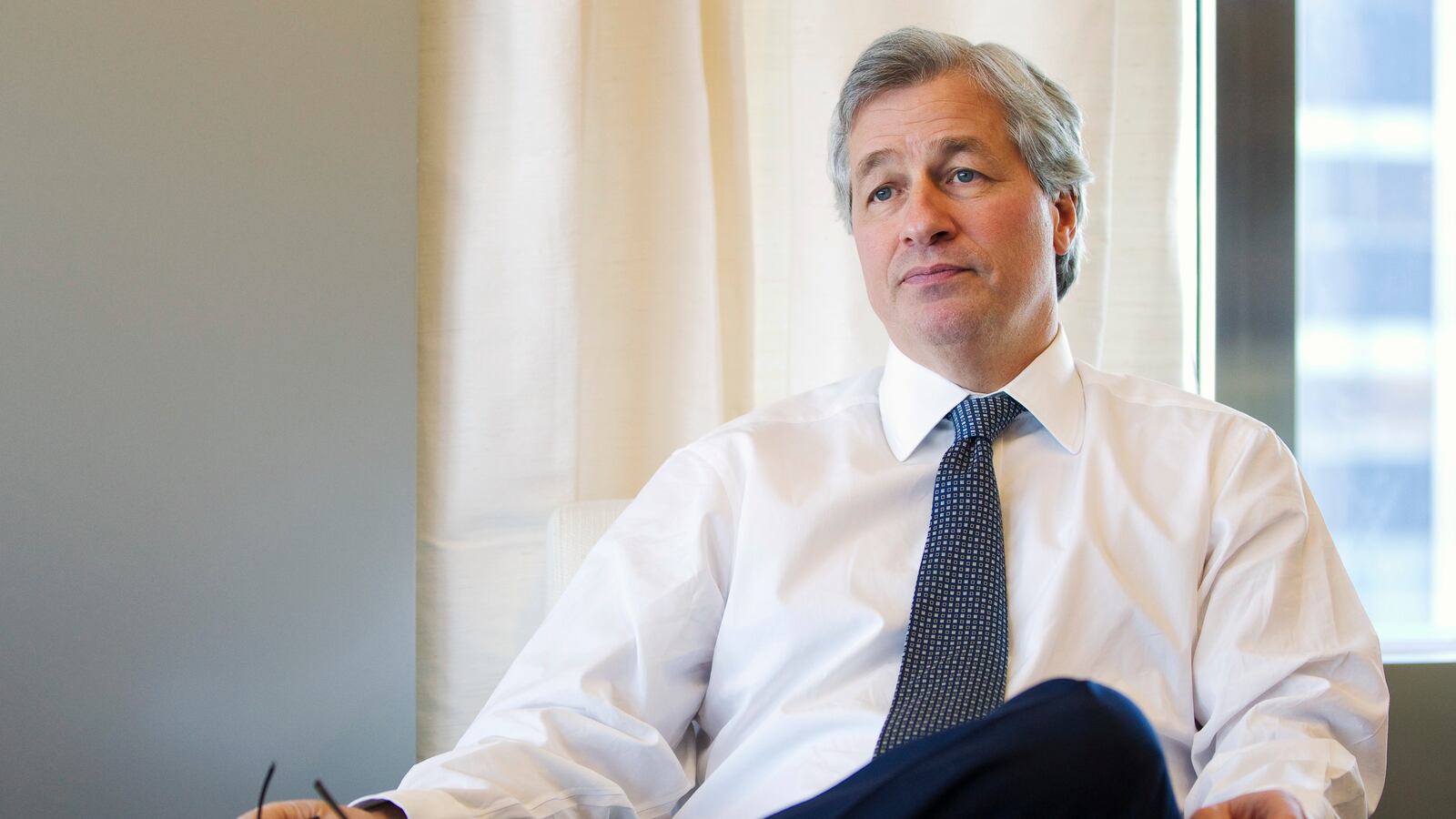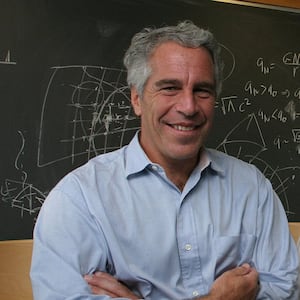When JPMorgan CEO Jamie Dimon was questioned under oath last week over the bank’s lengthy relationship with sex trafficker Jeffrey Epstein, he was asked whether he had received letters from any survivors of Epstein’s abuse.
A transcript of Dimon’s deposition—taken as part of two lawsuits accusing JPMorgan of facilitating Epstein’s sex ring—reveals the executive testified that he didn’t recall getting one particular victim’s mail but that he had “enormous sympathy” for her.
That victim, The Daily Beast has learned, was Haley Robson, who was a Florida high-schooler in 2004 when Epstein exploited her and made her one of his recruiters.
“Dear Jamie Dimon,” Robson wrote, according to a copy of the letter reviewed by The Daily Beast. “I cannot begin to explain how Epstein has consumed my life. I cannot make you see, force you to feel or even request that you show compassion to all the survivors.”
“I don’t understand how so many people, colleagues, knew what was going on, or had evidence and information that could have helped us, and chose not to speak up,” she continued, before referring to a past smear campaign launched by Epstein’s legal team to discredit victims and help him avoid federal charges in 2008. “Why did we all get picked apart publicly when the reality is you and many more knew something and didn’t speak up?!”
“I may not be as smart as you, but we should at least agree that the information you withheld has hurt me and many others,” Robson wrote. “Everyone makes mistakes and has regrets. If you are a good human you will just admit to making a mistake and be the first to try to do what is right to end this chapter on a positive note for all of us.”
Robson wasn’t the only victim to contact JPMorgan bosses in recent weeks.
Courtney Wild, who was 14 when Epstein abused her and who sued the government over his lenient plea deal, penned a letter to executive Mary Erdoes last month asking her to support the victims’ fight for justice. Wild wrote that she believed “JP Morgan was Epstein’s right hand in allowing him to become the most abusive sex offender in history.”
“Yet, rather than acknowledging a wrong doing, accepting responsibility, making an apology to all of us, and doing what is right, I understand that JP Morgan has unleashed an army of lawyers to torture the victims who brought the cases and put them through even more pain and suffering,” Wild wrote. “Does nobody at JP Morgan have a conscience?”
Erdoes, the CEO of JPMorgan’s asset and wealth management business and a lieutenant under Dimon, testified in a deposition that she communicated with Epstein via email and phone calls and twice visited his New York townhouse. She and other JPMorgan officials including Jes Staley (who is now accused of assaulting an Epstein victim) allegedly held discussions about the accusations against Epstein but decided to keep him as a client.
“I have fought my entire adult life against Jeffrey Epstein, his powerful associates, his investigators, his lawyers, and even the US government for justice,” Wild added. “I don’t want to have to fight you too.”
A representative for JPMorgan declined to comment on the letters.
Late last year, a victim of Epstein known as Jane Doe and the U.S. Virgin Islands (USVI) government sued JPMorgan for allegedly enabling and profiting from Epstein’s trafficking scheme. The bank has denied any wrongdoing and, in legal filings, pointed the finger at the USVI, claiming it had a “quid pro quo” relationship with Epstein. JPMorgan is also suing Staley, arguing he should be “solely liable” if Doe wins her case.
In April, Dimon told a CNN reporter, “Hindsight is a fabulous gift,” when asked whether the bank should have cut ties with Epstein after he pleaded guilty to soliciting a minor in 2008.
Throughout his recent deposition, Dimon said he was unaware of internal strife surrounding Epstein and didn’t realize Epstein was a JPMorgan customer until his New York arrest. “I don’t recall knowing anything about Jeffrey Epstein until the stories broke sometime in 2019,” Dimon testified, adding that he “had never even heard of the guy.”
Still, Dimon was questioned about Epstein’s email exchanges in which he discussed plans to invite Dimon to his Manhattan home; one 2009 email with Staley suggested bringing “Jamie” to a meeting, but Dimon testified he didn’t know anything about it. “I didn’t know Jeff Epstein,” Dimon said. “I never met Jeff Epstein. I never went to his house. I never went to his island. And I do not know exactly what he’s referring to here.”
Dimon also testified about a 2010 email from Epstein’s executive assistant Lesley Groff, who discussed Epstein’s “evening appointments” with Staley, Dimon, and another person whose name was redacted. Dimon again denied any knowledge of such a meeting.
In 2012, according to the deposition, JPMorgan employee Paul Morris emailed Epstein about a partnership with a person whose name was redacted and said, “I really appreciate everything you’re doing, and this is a fantastic opportunity that you are opening the door to. I briefed our CEO.” Dimon testified that he was unaware of Morris’ apparent plan.
When a plaintiff’s lawyer asked, “Were you aware that Jeffrey Epstein was promoting you to contacts as a candidate for Secretary of the Treasury?” Dimon answered, “Nope.”
Meanwhile, Erdoes testified under oath that she twice visited Epstein’s Manhattan lair—in 2011 to “settle a lawsuit that Mr. Epstein had against the bank regarding Bear Stearns hedge fund litigation” and in 2013 to terminate him as a client.
While Erdoes’ deposition raised questions about some of her emails—which show she was aware of news reports about Epstein’s abuse and had even joked about Epstein—she testified that she didn’t take action to review his accounts.
In one 2006 email, Staley told Erdoes that he’d attended a Huggy Bear concert the night before and “The age differences between husband and wives would have fit in well with Jeffrey. What a joke.” Erdoes replied, “Oh, and what I meant to tell you about last night was they [sic] were a few people laughing about Jeffrey.”
In 2007, JPMorgan employee Lisa Waters sent a New York Post article about Epstein’s trafficking of underage girls to bank executive Phil Di Iorio, who forwarded it to Erdoes. “7 a.m. this morning. Why does Lisa send that stuff?” Erdoes replied.
Asked whether she ordered “any further inquiry” into Epstein as a result, Erdoes answered that she didn’t recall. “There’s a normal process whereby legal risk and compliance will take any negative media searches,” Erdoes testified, “and escalate them as appropriate to whichever banker is responsible for said relationship and will dispose of that issue one way or another.”
Erdoes referred to Epstein’s sex crimes again in 2010, in an email to Staley. “The feds may not be quite done with JE,” she wrote, according to her deposition.
The banking honcho said she didn’t recall asking JPMorgan to probe Epstein that year, instead allowing the “process to happen” with legal risk and compliance teams. At another point, Erdoes testified that Staley “was the most senior executive on the Jeffrey Epstein relationship” and “should have had the proper conversations with legal risk and compliance about the situation.”
The deposition also referred to emails among JPMorgan staff about a 2011 meeting addressing concerns over abuse accusations against Epstein. “Jes Staley discussed the topic with Jeffrey Epstein, who replied there was no truth to the allegations, no evidence, and was not expecting any problems,” one email stated.
Erdoes testified that she terminated Epstein’s relationship with the bank after Staley’s departure in 2013, saying Staley was no longer there to advocate for Epstein and that she had concerns about his “large cash withdrawals.”
Internal bank documents cited in the deposition reveal that Epstein “routinely” made cash withdrawals of $40,000 to $80,000 “several times a month” for a total of more than $750,000 a year. Erdoes testified that Epstein claimed the cash was for aviation fuel and landing fees in other countries. (According to police, Epstein paid teenage girls $200 to $300, sometimes even $1,000 after he abused them at his mansions in Palm Beach and elsewhere.)

While underage, Courtney Wild was a victim of wealthy sex trafficker Jeffrey Epstein.
Emily Michot/Miami Herald/Tribune News Service via Getty ImagesWhen a lawyer asked Erdoes, “Based on what you know now, do you believe that Mr. Jeffrey Epstein was, in fact, involved in sex or child trafficking during the period 2006 through 2013?” she answered, “I don’t know what to believe.”
In her letter to Erdoes, Wild said that Epstein “was able to lure me and many high school kids to his house where he abused us in exchange for paying hundreds of dollars in cash.”
“As an adult, I am now learning how he was able to access an unlimited supply of cash in violation of banking laws,” she continued.
Wild accused JPMorgan of failing to notify authorities about Epstein’s suspicious cash withdrawals. “You could have helped us,” she wrote. “Instead, you chose to help him. That’s just evil.” She added that she chose to write to Erdoes because she’s a mother herself: “If you put yourself in our shoes, you would expect more from someone in your position.”
“We just want someone, some where [sic], to admit wrong doing promise to make changes so this never happens again, and recognize the pain we all suffered.”
The Daily Beast reviewed a second letter to Erdoes from a former model who signed her name as “Another Jane Doe.” The woman wrote that Epstein assaulted her when she was 23 and visited Epstein’s New York townhouse for what she believed was a job interview.
“I am beyond shocked and saddened to learn that a well known international banking institution knew about Epstein’s heinous crimes against young women and children and did nothing to expose it,” she wrote, adding, “Please do the right thing and help us now.”
To date, Robson and Wild say no one at the bank has replied to their letters.
“No response is a response,” Wild told The Daily Beast. “JPMorgan has always cared more about protecting Jeffrey or protecting themselves than protecting us.”








